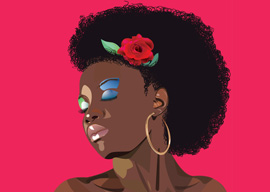
August 07, 2012

Nearly ten years later, a Chris Rock documentary taught the rest of us a new (and loaded) expression: Good Hair. In the film, black women admit to being “addicted” to relaxer, AKA “creamy crack,” praising its wonder-working powers in “wistful tones [that] make it sound like they’re discussing the time they lost their virginity.”
More recently, an article by Nancy Wolf called “Transracial Adoption and Hair, Hair, Hair!“ somehow made it past easily outraged National Review editor Rich Lowry. He’s not normally fond of candid articles about the tensions between whites and blacks”in this case, the hostility (white) mom Wolf encounters when out with her adopted (black) baby:
Within months, I started getting stares from other black women in public….One lady at the store actually walked me to the hairstyle aisle and showed me exactly what I should do. Another very kind woman sent products to school and left them in my older kids” locker….
Rich Lowry may or may not get out much, but this stuff is nothing new to me, despite my unlikely credentials as an amateur anthropologist in this esoteric topic. Being half-Scottish/half-German and raised in a Canadian city where Sicilian was as “black” as it got, I owe my knowledge of “black hair” and its byzantine intrigues mostly to Oprah Winfrey.
Her vast wig collection has never been a secret. (She calls them “my girls.”) After decades in the public eye, only this month did the billionaire media mogul, well into middle age, finally muster the courage to display her natural hair on the cover of her own magazine.
On one episode of her old show, acknowledging murmurs of confusion from the studio audience after a guest’s throwaway comment, Oprah pivoted in her chair and explained to “all you white folks” that “when black folks talk about getting a “perm,” they mean straightening their hair, not curling it.”
You could practically hear the entire audience scoot to the edge of their seats.
(Despite decades of liberal scolding, normal Americans love to talk about, and learn about, race.)
When I was a kid, Whoopi Goldberg made her (silly) name with a one-woman Broadway show that featured, among other characters, a little black girl with a white shirt stuck on her head who’s terribly proud of her “long, luxurious blonde hair.” The Guinness Book of World Records taught me that the first African-American millionaire was Madam C. J. Walker, the “hair culturist“ and entrepreneur.
Because I write about race, I get called a “racist” a lot. Alas, I can”t deflect this name-calling by protesting that “some of my best friends are black,” even if that was true. However, the only thing that revives my (wavy white-lady) perm in month #3 is “Twisted Sista,” a curl activator from Urban Therapy. I found it on the drugstore’s black-hair shelf. That’s gotta count for something, right?
Image courtesy of Shutterstock